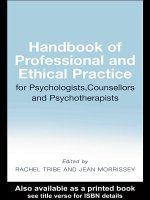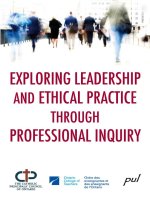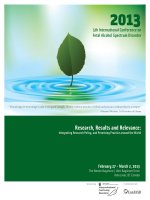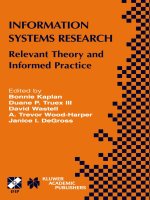Exploring Leadership and Ethical Practice through Professional Inquiry doc
Bạn đang xem bản rút gọn của tài liệu. Xem và tải ngay bản đầy đủ của tài liệu tại đây (6.65 MB, 325 trang )
“This page left intentionally blank.”
“This page left intentionally blank.”
Exploring Leadership
and Ethical Practice through
Professional Inquiry
Catholic Principals Council.indd 3 29/07/09 10:40:57
“This page left intentionally blank.”
LES PRESSES DE L’UNIVERSITÉ LAVAL
Exploring Leadership
and Ethical Practice through
Professional Inquiry
Déirdre Smith, Editor
Patricia Goldblatt , Editor
Catholic Principals Council.indd 5 29/07/09 10:40:58
Design and computer graphics: Mariette Montambault
Cover: iStockphoto
© Les Presses de l’Université Laval 2009
All rights reserved. Printed in Canada
Legal deposit, 3rd quarter 2009
ISBN 978-2-7637-8666-7
Les Presses de l’Université Laval
Pavillon Pollack, bureau 3103
2305, rue de l’Université
Université Laval, Québec
Canada, G1V 0A6
www.pulaval.com
Les Presses de l’Université Laval receives funding each year from the Société de
développement des entreprises culturelles du Québec for its entire publishing
program.
We wish to acknowledge funding from the Government of Canada through the
Book Publishing Industry Development Program for our publishing activities.
Catholic Principals Council.indd 6 29/07/09 10:40:59
To current and future school and system leaders.
Lou Rocha
Executive Director
e Catholic Principals’ Council of Ontario
For the highly committed and dedicated educational leaders in Ontario.
Brian McGowan
Registrar and Chief Executive Officer
Ontario College of Teachers
Catholic Principals Council.indd 7 29/07/09 10:40:59
“This page left intentionally blank.”
ix
Table of Contents
Foreword by Robert Starratt . . . . . . . . . . . . . . . . . . . . . . . . . . . xvii
Acknowledgements xxi
Introduction 1
Ethical Leadership Development 2
Cases from Professional Practice 4
Professional Inquiry 5
Inquiry Frameworks 5
Case Commentaries 6
Overview of Text 7
Case Matrix 9
Section I: Leaders as Ethical Decision Makers 15
Leaders as Ethical Decision Makers 15
Cases from Professional Practice 16
Case Commentaries 17
Case 1: Words of Destruction 19
Professional Inquiry 23
Case Commentary Critique 29
Catholic Principals Council.indd 9 29/07/09 10:40:59
Exploring Leadership and Ethical Practice through Professional Inquiry
x
Case Commentaries 29
Rita L. Irwin 29
Patrick M. Jenlink 30
Peter McLaren, Dianna Moreno and Jean J. Ryoo 32
Reflection on the Commentaries 34
Additional Reading 34
Case 2: An Emotional Friday Afternoon 37
Professional Inquiry 41
Case Commentary Critique 47
Case Commentaries 48
Julia O’Sullivan 48
Felicity Haynes 49
Elizabeth Campbell 51
Stefinee Pinnegar and Lynnette B. Erickson 52
Lyse Langlois 54
Craig E. Johnson 56
Reflection on the Commentaries 57
Additional Reading 57
Case 3: Initiated 59
Professional Inquiry 63
Case Commentary Critique 65
Case Commentaries 66
Jean Clandinin 66
Steven Jay Gross 67
Kay Johnston 69
Stéphane ibodeau 70
Reflection on the Commentaries 72
Additional Reading 72
Catholic Principals Council.indd 10 29/07/09 10:40:59
xi
Table of Contents
Section II: Leaders as Facilitators of Community 75
Leaders as Facilitators of Community 75
Cases from Professional Practice 76
Case Commentaries 76
Case 4: Striptease on Day ree 79
Professional Inquiry 84
Case Commentary Critique 88
Case Commentaries 89
Pauline Leonard 80
Brenda Beatty 90
Andy Hargreaves and Pauline Hargreaves 96
eresa Shanahan 98
Ulrika Bergmark 101
Reflection on the Commentaries 103
Additional Reading 103
Case 5: A School Divided 105
Professional Inquiry 108
Case Commentary Critique 110
Case Commentaries 111
Joan Poliner Shapiro 111
Patrick Duignan 112
Lorraine Savoie-Zajc 113
Ben Levin 116
Reflection on the Commentaries 117
Additional Reading 117
Case 6: Growing Pains 119
Professional Inquiry 122
Case Commentary Critique 124
Catholic Principals Council.indd 11 29/07/09 10:40:59
Exploring Leadership and Ethical Practice through Professional Inquiry
xii
Case Commentaries 125
John M. Novak 125
Ann Lieberman 126
Jeanne Doucet 129
Ellie Drago-Severson 131
Reflection on the Commentaries 133
Additional Reading 133
Section III: Leaders as Reflective Practitioners 135
Leaders as Reflective Practitioners 135
Cases from Professional Practice 136
Case Commentaries 137
Case 7: A Staffing Hotspot 139
Professional Inquiry 143
Case Commentary Critique 146
Case Commentaries 147
John Loughran . . . . . . . . . . . . . . . . . . . . . . . . . . . . . . . . . . . 147
Margaret Olson 148
Paul Axelrod 150
Jean Plante 151
Reflection on the Commentaries 153
Additional Reading 154
Case 8: Life Changes 155
Professional Inquiry 158
Case Commentary Critique 161
Case Commentaries 162
Alice Collins 162
Pat Rogers and Lara Doan 163
Katherine Merseth 165
Catholic Principals Council.indd 12 29/07/09 10:40:59
xiii
Table of Contents
Reflection on the Commentaries 167
Additional Reading 168
Case 9: e Principal in the Middle 171
Professional Inquiry 175
Case Commentary Critique 178
Case Commentaries 179
A.G. Rud 179
Julie Mueller 180
Denise E. Armstrong 182
Reflection on the Commentaries 183
Additional Reading 184
Section IV: Leaders as Models of Professionalism 185
Leaders as Models of Professionalism 185
Cases from Professional Practice 185
Case Commentaries 186
Case 10: Choosing Sides 189
Professional Inquiry 192
Case Commentary Critique 196
Case Commentaries 197
John Wallace 197
Anthony H. Normore 199
John Lundy 201
Pierre Toussaint 203
Reflection on the Commentaries 205
Additional Reading 205
Case 11: An Occasional Dilemma 207
Professional Inquiry 212
Catholic Principals Council.indd 13 29/07/09 10:40:59
Exploring Leadership and Ethical Practice through Professional Inquiry
xiv
Case Commentary Critique 214
Case Commentaries 215
Lindy Zaretsky 215
James Heap 219
Jules Rocque 221
Reflection on the Commentaries 222
Additional Reading 222
Case 12: Samantha 225
Professional Inquiry 230
Case Commentary Critique 232
Case Commentaries 233
Richard Shields 233
Michel Saint-Germain 235
Tom Russell 237
Reflection on the Commentaries 238
Additional Reading 239
Section V: Leaders as Educational Partners 241
Leaders as Educational Partners 241
Cases from Professional Practice 241
Case Commentaries 242
Case 13: Blindsided 245
Professional Inquiry 249
Case Commentary Critique 251
Case Commentaries 253
Cheryl J. Craig . . . . . . . . . . . . . . . . . . . . . . . . . . . . . . . . . . . 253
Carolyn Shields 255
Pam Bishop 257
Anne Phelan 258
Catholic Principals Council.indd 14 29/07/09 10:41:00
xv
Table of Contents
Reflection on the Commentaries 260
Additional Reading 260
Case 14: e School Supper Club 263
Professional Inquiry 267
Case Commentary Critique 269
Case Commentaries 271
Robert Stake and A. Rae Clementz 271
Vivienne Collinson 273
Linda Grant 274
Laura C. Jones 276
Reflection on the Commentaries 278
Additional Reading 278
Final Reflections 279
Leadership Self-Reflection Instrument 280
Self-Reflection 280
Self-Inquiry 280
Bibliography 281
About the Editors 293
About the Contributors 295
Catholic Principals Council.indd 15 29/07/09 10:41:00
“This page left intentionally blank.”
xvii
Foreword
Robert J. S
Professor of Education, Boston College
Case studies provide useful learning opportunities for those preparing
to become teachers and administrators, as well as for those already on the
job who are seeking to advance the quality of their leadership practice.
Case studies allow participants to imaginatively enter into the dramas that
emerge amidst the realities of life in schools. ese dramas involve students,
teachers and parents in relationships of conflict, in situations of unequal
power and status, in circumstances charged with moral consequences, in
the pulls and tugs of personalities, clashing assumptions and beliefs, over-
lapping areas of responsibilities, and exceptional circumstances with few
policy guidelines – all of which call for professional judgment, diverse
perspective taking, value prioritizing, and a search for reasonable short-
term and goal focused long-term responses.
Case studies often reveal that life in schools is not the rational process
school leaders would like the public to think it is. In order to garner public
support and confidence, schools present themselves to their communities
as places where teachers are all in agreement over what should be taught
and in what sequence, using what specific pedagogies, as places where all
children are treated fairly and with respect and care, where values of the
community are taught and upheld, and where those in charge know what
they are doing and act rationally and decisively within clear policies and
procedures. While the staff in all schools, in their own way, want to believe
Catholic Principals Council.indd 17 29/07/09 10:41:00
Exploring Leadership and Ethical Practice through Professional Inquiry
xviii
that this picture of their school is the ideal they all desire, they would
readily admit that the reality falls far short of the ideal on most days.
Rather, considering the realities of their students’ home situations,
their students’ readiness to successfully engage in the learning tasks put
before them varies enormously from student to student and from class
period to class period. Given limited resources for smaller classes, the
steady flow of new curriculum materials, and the finite hours in the school
day and week, some teachers will inevitably feel shortchanged and frus-
trated. Given the variability among teaching staff, some parents will feel
that their children have not been placed with the better teachers. Given
the pressures that administrators face every day to respond to every prob-
lem situation that arises in the building, criticisms of their leadership, their
decisiveness, and their sensitivity will arise.
In other words, schools in contemporary societies are places where
messes occur on a daily basis. Preparing for their professional careers and
sustaining their professional practice require that educators continue to
learn, both in university programs and on the job, how to respond to the
immediacy of situations that arise every day in the practice of teaching
and administering schools. Some of these situations clearly involve ethical
issues or dilemmas requiring ethical deliberation and reflection. Some of
these situations involve misunderstandings over professional responsibilities
that require more direct, pragmatic responses. Some involve challenges to
authority or institutional legitimacy and require both policy clarification
and political compromise.
Case studies, therefore, provide opportunities to engage the drama of
school problems, conflicts, disagreements and challenges in a safe learning
environment where the players in the drama can adopt the role of one of
the protagonists, discuss with others their perceptions of the problem or
issue, and explore several alternative responses and their probable conse-
quences. rough multiple rehearsals of the messy drama of everyday life
in schools, educators can develop greater professional flexibility and adapt-
ability in their responses, can become more reflective about the assumptions
they and others bring to conflict situations, can develop a deeper sense of
compassion toward the human propensity to unintentionally create messes,
can clarify the core values they will stand by, can explore policy issues
behind decisions, and finally, can grow in their capacity to deal with the
short-term symptoms of problems while looking toward the more effect-
ive long-range preventive measures required to forestall similar problems
in the future.
Catholic Principals Council.indd 18 29/07/09 10:41:00
xix
Foreword
e cases presented in this text offer a wide variety of situations that
may very well crop up next week in any given school. Engaging the issues
in these cases will help develop the pragmatic responses and value-laden
considerations required not only for survival on the job, but also for
developing a sense of leadership that can turn many of these situations
into opportunities for the growth of those involved.
Catholic Principals Council.indd 19 29/07/09 10:41:00
“This page left intentionally blank.”
xxi
Acknowledgements
Exploring Leadership and Ethical Practice through Professional Inquiry
has been a collaborative provincial project between the Ontario College
of Teachers and the Catholic Principals’ Council of Ontario. is partner-
ship was realized through the work of the editors Déirdre Smith, Patricia
Goldblatt and principals Denis Maika, Nelly Kelders and Barbara
McMorrow. e development, structure and content of this book honour
and reflect the important role of dialogue, inquiry and community within
educational leadership practices.
e principals and vice-principals who wrote the cases presented in
this book are committed to supporting leadership formation. ey reflected
on their professional practice within diverse education contexts and offered
their lived experiences as curriculum for the enhancement of ethical prac-
tice and leadership development. eir experiences serve as educative
resources for the teaching profession and teacher education.
James Moloney, Jerry Wheeler, and Carson Allard supported the
validation of the written cases and the professional inquiry processes
included in this text. ousands of aspiring and practising principals and
vice-principals engaged with these cases in both online and face-to-face
leadership courses. eir feedback affirmed the importance of these writ-
ten case experiences as meaningful and relevant leadership curriculum.
e case commentary writers generously offered their wisdom and insight
to help extend professional dialogue and inquiry regarding the complex
nature of educational leadership in our ever-changing society.
e College’s Standards of Practice and Education Committee also
significantly contributed to the realization of this text. Committee mem-
bers include Ted Coulson, Suzanne DeFroy, Brian Doubleday, Nick Forte,
Catholic Principals Council.indd 21 29/07/09 10:41:00
Exploring Leadership and Ethical Practice through Professional Inquiry
xxii
Gary Humphreys, Nancy Hutcheson, Peter Joong, Bill Matheson, Ruth
Ann Penny, Jennifer Pitt, Susan Robertson, Patrick Slack, Tianna
Travaglini-Babic and Don Watson.
e assistance provided by Kristine Egli, Suzanne Baril, Carmen
Dragnea and the Ontario College of Teacher’s Communications staff
helped this book to become a reality through their careful research, for-
matting, editing and translation.
is text has been a collaborative endeavour from inception to
completion. It illustrates an approach to shared professional inquiry that
includes the voices of practitioners, academics, researchers and policy
makers.
Catholic Principals Council.indd 22 14/09/09 14:15:11
1
Introduction
Ethical professional practice is the hallmark of effective educational
leadership. To be an exemplary educational leader it is imperative to have
a deeply developed and integrated level of ethical knowledge and aware-
ness. is essential form of professional knowledge enables educational
leaders to respond to the complex and multi-faceted ethical dimensions
inherent in the challenges, tensions, issues and dilemmas that are consist-
ently encountered in professional practice.
An unwavering commitment to fostering the collective ethical know-
ledge and consciousness of all members of the school learning community
is a necessary prerequisite for educational leaders today. e joint develop-
ment of ethical understanding, sensitivity and agency can enable all
members of an educational community to respond to moral issues and
challenges with critical awareness, transparency and integrity.
Exploring Leadership and Ethical Practice through Professional Inquiry
is a collaborative collection of practices, commentaries and educative
pedagogies designed to support the development and enhancement of
ethical professional practice in education. is text was created by integrat-
ing the experiences and insights of practising educational leaders and
academic scholars. School principals and vice-principals write about the
dilemmas they have encountered as educational leaders in the province of
Ontario. Teaching in the province of Ontario is shaped by the existence
of an established set of ethical standards for the teaching profession. ese
standards were developed by educators and members of the public. e
ethics of Care, Respect, Trust and Integrity (Ontario College of Teachers,
2006a) that comprise these standards serve as principles to inspire, inform
and support educators’ ethical practice. e presence of these public
Catholic Principals Council.indd 1 29/07/09 10:41:01
Exploring Leadership and Ethical Practice through Professional Inquiry
2
principles is intended to provide collective ethical guidance for educational
leaders and school communities.
is collection of narratives and commentaries has been developed as
a curriculum and pedagogical resource for leadership formation, teacher
education and professional learning. It honours the voices, perspectives
and experiences of educational leaders. It respects the insights and role of
academic scholars in helping to explicate the lived knowledge and ethical
wisdom of practitioners. is text illuminates processes for the integration
of theory and practice through activities that will foster meaningful and
useful educative applications. Most importantly, it illustrates that the lived
experiences of educators can be effectively used to advance educational
leadership and ethical practice. In this text, the professional practice of
educators provides effective sources of pedagogy for exploring leadership
dimensions and the ethical nature of professional knowledge and action.
ETHICAL LEADERSHIP DEVELOPMENT
e ongoing ethical formation and consciousness of educational lead-
ers resides at the foundational core of authentic and effective ethical
leadership. e ongoing development of ethical awareness and knowledge
are moral imperatives for contemporary educational leaders. e authen-
ticity, presence (Starratt, 2004) and critical consciousness (Freire, 2005;
Giroux, 2001) of leaders is central to the facilitation of learning com-
munities that are socially just, inclusive and honour diversity. ese lead-
ers, as agents of ethical change, possess strong conviction as they strive to
honour the dignity of the individual, demonstrate courage to act justly,
maintain dedication to social justice, sustain a deep desire to collaboratively
develop the ethical leadership capabilities of all members of the school
community and model an unwavering commitment to the common
good.
Presence, according to Starratt (2004), can be understood as an ethic
of educational leadership that underpins all actions and decisions.
Educational leaders who practise the ethic of presence engage with learn-
ers, teachers, parents and others in ways that convey deep sensitivity,
attention, honesty, empathy and a form of listening that communicates
to others that they are genuinely being heard and understood (Tschannen-
Moran, 2004; Miller, 2000). is form of listening is devoid of judgment
or distraction. It involves being fully present in body and mind to others.
Embodying the ethic of presence can be transformational in relationships
Catholic Principals Council.indd 2 29/07/09 10:41:01









